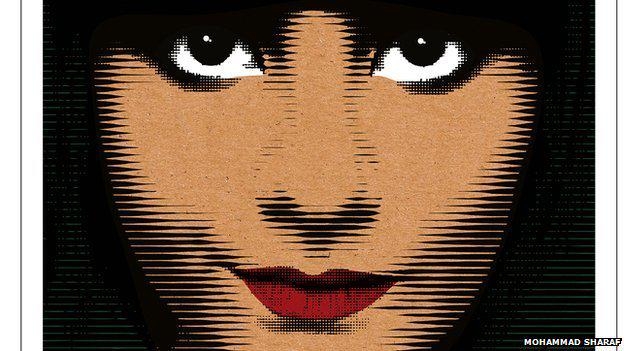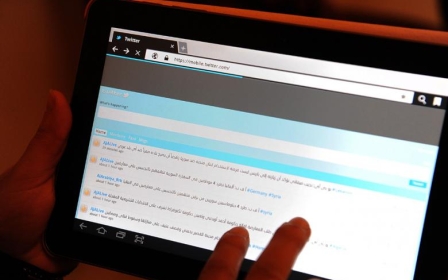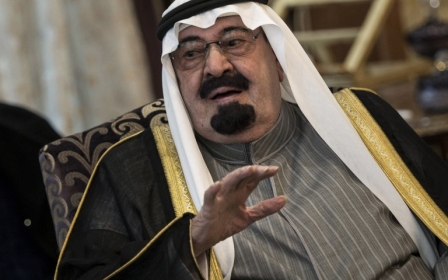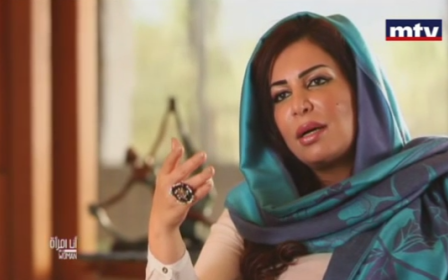The two women drivers blazing the trail for freedom of movement in Saudi

On 30 November, 25-year-old Loujain Hathloul drove her car to the Saudi border from the United Arab Emirates. She arrived at midday, live tweeting her trip, and uploaded a video of her trek that has been viewed more than 800,000 times.
Hathloul is a Saudi national with a UAE-issued driver's licence. After Saudi border officials confiscated her passport, she was forced to wait up to 24 hours and spent a night in her car. She was later taken to the al-Batha port police station.
According to a statement released by the October 26th Driving Campaign - a movement formed in 2013 that seeks to end the country’s ban on female driving - Loujain is currently at a young women’s correctional facility in al-Ahsa. No further information has emerged about her status.
Another woman, journalist Maysaa al-Amoudi, was also arrested after driving to the border from the UAE to support Loujain. Saudi authorities interrogated both women without the presence of a lawyer, according to organisers familiar with their cases.
Arbitrary arrest
The two women’s arrests are classified under arbitrary detention, according to Radidja Nemar, the Gulf regional legal officer at the Alkarama Foundation, which works on regional human rights violations. The organisation’s website is banned in Saudi Arabia.
“In recent years, more women have been speaking up about their rights in Saudi Arabia,” Nemar said, “and the authorities have retaliated against them in the form of arbitrary arrests. It’s very worrying. Victims of arbitrary arrest are usually males who called for reform, gender equality, etc.”
Arbitrary arrest is most often applied to people who disturb the status quo with their political views or non-conformity to society. As such, there is no mandate or arrest warrant given, and access to a lawyer is not permitted during interrogation. Once in jail, detainees are not allowed to see members of their families.
Although there are no official figures for those who are arbitrarily detained; Nemar estimates the number sits at more than 3,000.
“Saudi authorities lately have been retaliating against female human rights defenders in the form of arrests and travel bans,” Nemar added.
Hala al-Dosari, a health researcher and one of the members of the October 26th Driving Campaign, said that at the al-Batha port police station, Hathloul was not allowed to retain her passport in order to go back to the UAE.
“Her driving action is a dramatic challenge to the authorities,” al-Dosari said. "Loujain's act will be shown by the state as an act to incite and embarrass the country."
Al-Dosari said she fears the Saudi authorities will use legal pretexts to charge Hathloul, such as Article 16 of the country’s media law, which states that the use of the Internet to spread information that affects state unity is illegal. The anti-terror law - which al-Dosari explained is used regularly against activists who challenge the status quo - is another legal pretext that the authorities might exploit, as was the case for imprisoned Saudi lawyer and human rights activist Walid al-Kheir.
Adam Coogle, a Middle East researcher at Human Rights Watch, told Middle East Eye that it’s uncertain what kind of punishment Hathloul and al-Amoudi may face.
“This particular case got a lot of media attention,” he said. “The outcome of it will be a good indicator of where the country is heading [in terms of lifting the ban.]”
Campaigns to break driving ban
Since 1990, an informal prohibition on women driving in Saudi Arabia has been treated as official state policy after the country's highest religious authority, the Grand Mufti, issued a fatwa (religious edict) which said that women who drive would be exposed to temptation and "social chaos.”
While there is no written legislation that explicitly bans women from driving, women cannot apply for a driver's licence in the kingdom, thus making it illegal for them to drive. The “law” is a blend of tribal norms, religious customs, and traditional values in society.
The first public response to the ban occurred that same year, with dozens of women driving their cars in the capital of Riyadh. Many were arrested, banned from travelling outside the country for a year, and lost their jobs. It would be nearly two decades later before another organised attempt to defy the ban took place.
In 2007, prominent activist and writer, Wajeha al-Huwaider co-founded the Association for the Protection and Defence of Women's Rights in Saudi Arabia, which had sub groups, or leagues, that dealt with every aspect of women's rights, including political representation and protection from domestic violence. On 23 September, a national holiday, a petition organised by the League of Demanders of Women's Right to Drive Cars in Saudi Arabia was presented to the monarch, King Abdullah. Following his coronation in 2005, the king had previously said: “I believe the day will come when women [in Saudi Arabia] will drive.”
The following year, al-Huwaider filmed fellow activist, Manal al-Sharif driving on International Women's Day. Al-Sharif was arrested for driving a few years later in May 2011, and was released after 10 days on condition that she wouldn’t speak to the media. When her application for a driver's licence was rejected, she filed an appeal, but the Ministry of Interior threw her case out.
Women2Drive
With the advent of social media and the gleam from Arab Spring optimism still fresh in the region, a campaign called Women2Drive was formed in Saudi Arabia in 2011, demanding freedom of movement and the right for women to drive. A call to action went out on 17 June, but campaign organisers were quick to blunt the edges by issuing conditions for participants to adhere to such as wearing the veil and plastering a photo of King Abdullah on their cars.
The official reaction to the initial Friday protest day was generally quiet, with the government choosing to look the other way. For the next few weeks, dozens of women drove their cars around their neighbourhoods and on main streets. Five women were arrested in Jeddah, in what was the first crackdown on the movement. One woman, Shaima Jastaina, was originally sentenced to 10 lashes but was later pardoned by the king.
In April 2013, the king’s nephew, Prince al-Waleed bin Talal publicly backed women driving in Saudi Arabia, saying it made sense economically. Women have to rely on male relatives or drivers, and lower-income families cannot always afford to pay $400 to a foreign driver.
“Women driving will result in dispensing with at least 500,000 foreign drivers,” the prince tweeted, “and that has an economic and social impact for the country.”
A third campaign was launched on 26 October 2013, with participants encouraged to post photos and videos of themselves driving. Hathloul was among the participants. Despite receiving calls from representatives of the Ministry of Interior who warned the women not to go out and drive, the women were not deterred.
The campaign was denounced by the country's conservative clerics as a conspiracy, and people protested outside the King’s palace in Jeddah against the drivers. Sheikh Saleh al-Lohaidan drew the ire of many by issuing a fatwa saying that women who drive risk damaging their ovaries, and are more likely to give birth to children with health problems.
No arrests were made, but many of the women who drove were taken to the police station and forced to sign pledges that they would not drive again. In one case, a woman had her car confiscated for one year, and the 26 October campaign helped her acquire another in order to get by.
The campaign used social media to drive their message. A rendition of Bob Marley’s popular hit song “No Woman No Cry” - changed by comedian Hisham Fageeh to “No Woman No Drive” - instantly went viral on Youtube.
Reform or repression?
There has recently been some signs that Saudi Arabia might soon allow conditional driving for women.
After announcing in 2011 that women would be able to vote and run in municipal elections in 2015, last year the king appointed 30 female members to the 150-member Shura council. Speaking on condition of anonymity, a member of the council told the Associated Press last month that secret discussions regarding recommendations to allow women to drive were taking place. To be eligible, women must be over 30 years of age, would only drive on specific days and times, and have permission from their male relatives.
Yet al-Dosari was quick to dispel any notions that the country was opening up to give women their rights, describing state-approved decrees that favour women to vote or be part of the government as “cosmetic.”
“Rights that are granted by law to women are not the same as rights that allow women to take charge of their autonomy,” she said. “Women in state positions are appointed by the government which serves their own interests.”
According to al-Dosari, three female members of the Shura Council were subjected to a smear campaign by the government for their public support of women’s driving, and were forced to issue a statement refuting they were members of the campaign.
“The right to drive will not happen any time soon,” al-Dosari said. “We need to work on building popular local support, and figure out how to spread information and use media [that won’t incriminate] ourselves.”
Middle East Eye propose une couverture et une analyse indépendantes et incomparables du Moyen-Orient, de l’Afrique du Nord et d’autres régions du monde. Pour en savoir plus sur la reprise de ce contenu et les frais qui s’appliquent, veuillez remplir ce formulaire [en anglais]. Pour en savoir plus sur MEE, cliquez ici [en anglais].




